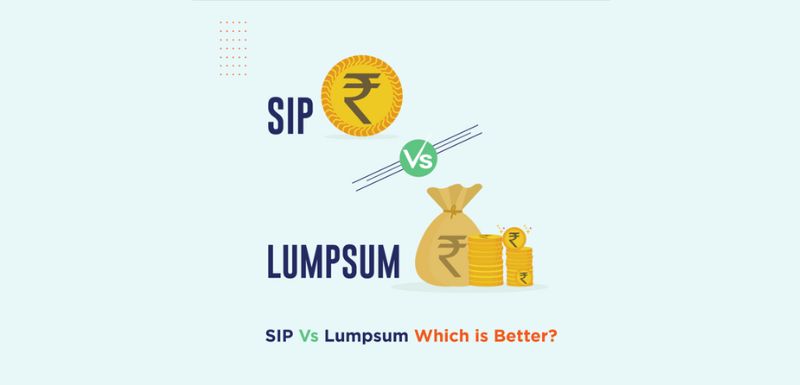SIP Vs Lumpsum Investments: Which Is Better?

Investing towards financial goals can be done in two ways. The first option is to invest a part of the income every month for the long term. The other option is to invest a lumpsum amount once and stay invested for the long term. Both options have pros and cons, and investors often wonder which option they should choose. In this article, we will discuss SIP vs Lump sum, and which approach an investor should take.
Before discussing the difference between SIP and lump sum, let us first understand each of them.
What is SIP (Systematic Investment Plan)?
An SIP (systematic investment plan) is one way of investing in mutual funds and other financial products. A SIP allows an investor to invest a specified amount at a specified frequency (for example, weekly, monthly, etc.) in a specified mutual fund scheme for a specified period.
For example, Karan has started a monthly SIP of Rs. 5,000 in a large-cap fund for 20 years. In this case,
- The specified amount is Rs. 5,000
- The specified frequency is monthly
- The specified mutual fund scheme is a large-cap fund
- The specified period is 20 years
On the SIP date, the investor’s bank account is debited automatically. The AMC credits the equivalent scheme units in the investor’s folio account. The AMC informs (SMS/email) the investor about every SIP instalment and sends periodic statements (for example, monthly) on the current value of the investments.
What is Lump Sum Investment?
A lumpsum investment involves making a one-time investment in a specified mutual fund scheme or any other financial product. For example, Kavita makes a one-time lumpsum investment of Rs. 1 lakh in a large-cap fund. Another example of a lumpsum investment includes Kavita making a fixed deposit of Rs. 1 lakh in a bank for 3 years.
At the time of lumpsum investment, the investor’s bank account is debited. The AMC credits the equivalent scheme units in the investor’s folio account. The AMC sends periodic statements on the current value of the investment.
SIP Vs. Lump Sum: Key Differences
|
SIP (Systematic Investment Plan) |
Lump sum Investments |
|
It involves investing a part of monthly income regularly over a period of time. |
It involves making a one-time investment. |
|
It is useful for long-term financial goals that require regular investment in equity mutual funds over a period of time. |
It is useful for short as well as long-term financial goals. However, not many people have lump sum amounts to make one-time investments. |
|
SIPs give the benefit of Rupee Cost Averaging (RCA). When the market is going down, you accumulate more units of the scheme at a lower NAV. When the market turns around, the value of earlier accumulated units goes up. |
There is no RCA benefit with lump sum investments. If the market goes up after your investment, you benefit. If the market goes down after your investment, you will have notional losses. |
|
It is suitable for risk-averse investors. |
It is suitable for investors with a high-risk appetite. |
|
AMCs specify their minimum investment amount to start a SIP. In most cases, it starts from as low as Rs. 100. |
The minimum amount for lump sum investments may start from Rs. 1,000, varying across AMCs. |
|
Suitable for long-term investments in equity mutual funds. It also works well for short-term investments in debt funds. |
Suitable for short and long-term investments in debt mutual funds. It also works well for long-term investments in equity mutual funds. |
|
SIP works in all market phases: Bull market, correction phase, bear market, recovery phase, etc. |
Lump sum investment works well when the investment has been made in a bear market or when the market is at the bottom of the current cycle. However, even market experts cannot predict the market bottom accurately. |
|
There is no need for market timing |
It requires market timing to maximise the returns |
|
It provides the investor with much-needed flexibility |
There is no flexibility as it involves a one-time investment. |
|
As it involves regular investments at a specified frequency, it inculcates the habit of savings and regular investments. |
As it involves a one-time investment, it doesn’t inculcate the habit of savings and regular investments. |
Lump Sum or SIP: Which Is Better for You?
SIP and lumpsum are two ways of investing in mutual funds. These two ways and other permutations and combinations exist because there is no one way that suits everyone. So, the answer to the question: SIP or Lumpsum: Which is better? depends on certain factors like the individual’s pattern of cash flows, the market phase, individual’s spending habits, etc.
It is recommended that retail investors follow the SIP mode of investing. It has various benefits like:
1) Disciplined Investment
In an SIP, you mandate automatic deduction of the SIP amount from your bank account. So, with SIP, you keep contributing regularly towards your financial goals. It makes you a disciplined investor across market cycles. Over time, the small, regular contributions build up into a substantial corpus.
2) Rupee Cost Averaging (RCA)
With the SIP mode of investing, you benefit from RCA. During market-down cycles, you accumulate more units at a lower NAV. Later, when the market turns and goes up, the value of your units accumulated during the down phase increases, and your entire portfolio benefits. Thus, RCA helps you navigate the market volatility and average your purchase price.
3) Power of Compounding
With SIP, you benefit from the power of compounding. Over time, the small, regular contributions build up into a substantial corpus. In the long run, you benefit from the power of compounding, creating wealth for yourself.
On the other hand, lumpsum investments can be risky. If you invest at the market peak and the market falls suddenly, you will be sitting on losses. So, with lumpsum investments, getting the market timing right is important, which is next to impossible. Whenever the market sees a decent fall from the peak, for example, the Nifty 50 falls 15-20%, you may consider investing some lumpsum money.
SIP Vs Lumpsum Investment: Which One Should You Choose?
When choosing between SIP vs one time investment, it is recommended that you choose the SIP mode of investment. If you get a lump sum amount, it is recommended that you park that amount in a debt fund like a liquid fund. You can start a systematic transfer plan (STP) from the liquid fund to a diversified equity mutual fund. The important common point between both modes of investment, whether SIP or lumpsum, is that you should stay invested for the long term. It gives your money time to grow and helps you meet your financial goals.
FAQs
What Are the Different Types of SIPs Available for Investors?
Some of the different types of SIPs available to investors include the following:
- Regular SIPs: The SIPs discussed in the earlier sections of this article are regular SIPs, wherein a fixed amount is invested at a specified frequency.
- Step-up SIP: It allows an investor to increase the SIP amount annually. The SIP amount can be increased by a percentage of the base SIP amount or absolute amount.
- Perpetual SIP: The SIP has a start date only, and no end date. The investor can pause or redeem the SIP at any time.
- Flexible SIP: It allows the investor some flexibility with regard to the SIP amount, frequency of investment, tenure, etc.
What Are Some Occasions on Which an Investor Will Have Lumpsum Money for Investment?
Some occasions on which an investor can receive lump sum money include the annual performance bonus, Diwali bonus, full and final settlement amount from the previous job, signup bonus, Income Tax Refund (ITR), cash gift during festival/anniversary/birthday/marriage, etc., maturity/redemption proceeds from financial products, winnings from some contest/sport/competition, etc.
As the article above discusses, an investor may park the lumpsum amount in a debt fund. They can start an STP, wherein a small amount will be regularly transferred to a diversified equity fund over a period of time.
Your Investing Experts
Relevant Articles
How Falling Markets Can Benefit Your SIP Plan
Market downturns can trigger anxiety, but for SIP investors, they present a golden opportunity. By consistently investing through volatility, you benefit from rupee cost averaging, accumulating more units at lower prices and enhancing long-term returns. With the power of compounding and a disciplined approach, SIPs turn market dips into wealth-building moments
Why is a SIP Investment Calculator beneficial?
With the rapid rise in online financial planning, more and more smart investors are choosing SIP investments as their investment avenue of choice for meeting their long and short term goals. As a thumb rule, SIP’s work best when you dispassionately keep them running despite the ups and downs of the markets.
How to Use SIPs to Create Long-Term Wealth
The financial planning journey to create wealth, and fulfil financial goals is a marathon, not a sprint. In this marathon, investing regularly in a disciplined manner through the systematic investment plan (SIP) route is the key to creating long-term wealth. In this article, we will understand how a consistent and disciplined long-term SIP investment can provide you with the benefits of compounding and create wealth.



